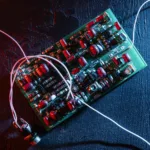
Introduction
When it comes to tracking time, stopwatches and timers are indispensable tools. These tools come in varied models with different features and specifications. Both these devices can measure time; however, they differ in various aspects. This guide helps you understand the key differences, purposes, types, selection parameters, and applications of stopwatches and timers to help you make an informed decision for your needs.
What are Stopwatches and Timers? Understanding Their Basics and Purpose
Stopwatches are handheld timekeeping devices designed to measure elapsed time. These watches are commonly employed in sports, experiments, and any situation where precise timing of an activity is needed. A stopwatch starts at zero and can usually start, stop, and reset the timer with great accuracy. It can also function as split and lap times and displays results in hours, minutes, seconds, and fractions of a second.
Timers are designed to count down from a set or specific amount of time. Unlike a stopwatch, which tracks elapsed time, a timer works by counting down to zero, alerting the user when the set time has run out. A timer is often used in activities requiring a set time duration, such as cooking, studying, and productivity techniques.
Different Types of Stopwatches & Timers You Should Know
Stopwatches and timers are available in several types, each designed for specific applications and purposes. Some standard types include:
Mechanical Stopwatches
Mechanical stopwatches, also called analogue stopwatches, are the traditional types that operate using a winding mechanism. They tend to have a nostalgic appeal and are often used for vintage sports events or as collector’s items. Analogue models are durable and reliable; however, they may not offer the precision or advanced features of modern digital models.
Digital Stopwatches
Digital stopwatches are the most common type, with advanced features and digital or LCD displays. They provide more accurate timing and can feature additional functions like lap time memory, countdown, and multiple timing modes. A digital stopwatch is an easy-to-read, compact, and reliable choice for sports, laboratories, and professional timekeeping.
Sport-Specific Stopwatches
Sports stopwatches are designed specifically for athletic use and competitive environments. They come with large buttons for easy use during high-speed activities and other features, such as lap memory, split times, and water resistance. Examples include swimming stopwatches and race timing stopwatches.
Countdown Timers
A countdown timer is designed to count down from a specific time. These timers are simple to use and ideal for multiple activities like cooking, studying, testing, or event management. Countdown timers can be found in both mechanical and digital models, and the latter can usually store preset times for repeated use.
Interval Timers
Interval timers are designed to set multiple work and rest cycles. They are ideal for activities requiring alternating work periods and rest. Interval timers come with alarms to signal the start and end of each period and cycle.
Kitchen Timers
Kitchen timers are simple and easy to use. They often have loud alarms and large displays and can count down from several hours or minutes. Moreover, they are versatile, affordable, user-friendly, and often feature-rich, making them ideal for cooking, baking, and food preparation.
Industrial & Professional Timers
Industrial timers are heavy-duty timers built to withstand tough environments. Additionally, these rugged devices are used in manufacturing, warehouses, process management, factories, and laboratory settings where exposure to dust, moisture, or vibration is common. Industrial and professional timers incorporate features like programmable cycles, remote start/stop capabilities, and automatic resets.
Key Features to Consider When Buying Stopwatches & Timers
With so many options available, it is often overwhelming to select the right stopwatch and timer for your needs. However, when looking to buy one, consider the following factors to make informed decisions for your specific needs:
Accuracy: Look for stopwatches with precision to the millisecond if you’re in a field where accuracy is critical, such as competitive sports or scientific research.
Display: Choose between digital and analogue displays based on your preference and the context of use.
Durability: For outdoor or industrial applications, select devices with water-resistant and shockproof features to ensure longevity.
Functionality: Look for split time, multiple countdown modes, lap memory, and adjustable time settings.
Power Source: Decide between battery-operated, wind-up, or rechargeable models based on your convenience and usage frequency.
Size and Portability: Compact and lightweight designs are ideal for handheld use, while larger models may better suit stationary setups.
Best Uses for Stopwatches & Timers Across Different Sectors
These essential timekeeping devices are indispensable across different environments for a variety of purposes. Some standard uses and environments include:
Sports and Athletics: Stopwatches are a staple in sports events, from running marathons to swimming competitions. Features like lap timers and split-time memory are essential for coaches and athletes to track performance during training and competitions. Timers are also used in event countdowns and timing-specific training exercises.
Cooking & Kitchen Use: Timers are indispensable in the kitchen, ensuring everything is cooked correctly. Multi-timers are ideal if you’re managing multiple dishes at once.
Work & Productivity: Timers have become a productivity tool for individuals and businesses alike. These devices come in different countdown formats designed for specific tasks at hand at specific intervals, such as a 1 minute timer and a 5 minute timer. Digital timers with easy-to-set countdowns make this process more efficient.
Industrial Applications: In manufacturing, quality control, and process monitoring, industrial timers help track time-sensitive tasks, ensuring processes run smoothly and are monitored precisely.
Education & Research: Stopwatches and timers are commonly used in scientific experiments, classroom settings, and research. Precision timing is vital when measuring time-sensitive reactions or ensuring accuracy in timed experiments.
Final Thoughts: Choosing the Perfect Timekeeping Tool
Stopwatches and timers are often overlooked, yet essential devices for enhancing productivity, improving performance, and streamlining multiple processes. Selecting the right stopwatch or timer depends on your specific needs, from precision in sports to ease of use in the kitchen. Available in a variety of types, it is essential to consider factors like accuracy, ease of use, battery life, and features to find the perfect tool for your specific requirements.





















